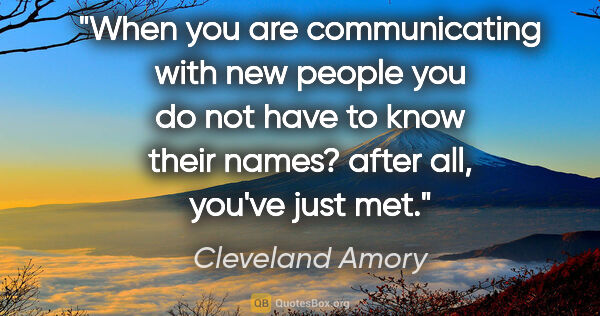Communal Quotes (page 51)
Each one of us is alone in the world. He is shut in a tower of brass, and can communicate with his fellows only by signs, and the signs have no common value, so that their sense is vague and uncertain. We seek pitifully to convey to others the treasures of our heart, but they have not the power to accept them, and so we go lonely, side by side but not together, unable to know our fellows and unknown by them.
W. Somerset Maugham
Nations are not communities and never have been. The history of any country, presented as the history of a family, conceals the fierce conflicts of interest (sometimes exploding, often repressed) between conquerors and conquered, masters and slaves, capitalists and workers, dominators and dominated in race and sex. And in such as world of conflict, a world of victims and executioners, it is the job of thinking people, as Albert Camus suggested, not to be on the side of the executioners.
Howard Zinn
If there is one fact we really can prove, from the history that we really do know, it is that despotism can be a development, often a late development and very often indeed the end of societies that have been highly democratic. A despotism may almost be defined as a tired democracy. As fatigue falls on a community, the citizens are less inclined for that eternal vigilance which has truly been called the price of liberty; and they prefer to arm only one single sentinel to watch the city while...
Gilbert K. Chesterton
The mysteries of a universe made of drops of fire and clods of mud do not concern us in the least. The fate of humanity condemned ultimately to perish from cold is not worth troubling about. If you take it to heart it becomes an unendurable tragedy. If you believe in improvement you must weep, for the attained perfection must end in cold, darkness and silence. In a dispassionate view the ardour for reform, improvement for virtue, and knowledge, and even for beauty is only a vain sticking up...
Joseph Conrad
Nothing was ever in tune. People just blindly grabbed at whatever there was: communism, health foods, zen, surfing, ballet, hypnotism, group encounters, orgies, biking, herbs, Catholicism, weight-lifting, travel, withdrawal, vegetarianism, India, painting, writing, sculpting, composing, conducting, backpacking, yoga, copulating, gambling, drinking, hanging around, frozen yogurt, Beethoven, Back, Buddha, Christ, TM, H, carrot juice, suicide, handmade suits, jet travel, New York City, and then...
Charles Bukowski
Great short stories and great jokes have a lot in common. Both depend on what communication-theorists sometimes call “exformation,” which is a certain quantity of vital information removed from but evoked by a communication in such a way as to cause a kind of explosion of associative connections within the recipient. This is probably why the effect of both short stories and jokes often feels sudden and percussive, like the venting of a long-stuck valve.
David Foster Wallace
It then becomes necessary to stop short and make a choice: Either/Or. Either one drifts with their absurd system of ideas, believing that this is the human community. Or one dissents totally from their system of ideas and stands as a lonely human being. (But luckily one notices that the others are in the same crisis and making the same choices.)
Paul Goodman
We have retreated from the perennial values. I don't think that we need any new values. The most important thing is to try to revive the universally known values from which we have retreated. As a young man, I really took to heart the Communist ideals. A young soul certainly cannot reject things like justice and equality. These were the goals proclaimed by the Communists. But in reality that terrible Communist experiment brought about repression of human dignity. Violence was used in order to...
Mikhail Gorbachev
…modern man no longer communicates with the madman […] There is no common language: or rather, it no longer exists; the constitution of madness as mental illness, at the end of the eighteenth century, bears witness to a rupture in a dialogue, gives the separation as already enacted, and expels from the memory all those imperfect words, of no fixed syntax, spoken falteringly, in which the exchange between madness and reason was carried out. The language of psychiatry, which is a monologue by...
Michel Foucault

